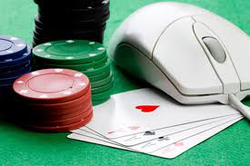The Department of Justice of the United States takes position for legislation intra-State concerning online gambling, other than sports betting. State laws are currently restrictive.
http://www.thejournalofregulation.com/spip.php?article1456

In the Unites States, the Federal Act, the Interstate Wire Act, is now performed by the Department of Justice as that only prohibiting sports betting and not poker online. In addition, States have to make arrangements if they want to liberalize the game of poker online. In February 2012, there is that many States have explicitly maintained the ban, only having liberalized and permits issued for Nevada.
© thejournalofregulation
The online game represents the situation where technology makes it impossible to maintain the prohibition of the activity, because borders don’t exist on the Internet and anonymity is easy. However pure and simple liberalisation is not a solution because the game is a dangerous activity for individuals who devote himself (addiction, ruin, etc.) and the States have legitimate rights to assert (taxation, fight against money laundering) that remain unknown. The legislative art is therefore more than in no other sector both compelling and legitimate.
The reference Act is federal, Interstate Wire Act, originating from 1961, at time where there was no Internet. In December 2011, the Department of Justice found that the Federal law related only sports betting and poker. Concerning the existing laws, this is a radically new reading, as a result of the fact that sport games and the card games rise not at all the same dangers, because the first one are much more dangerous, in that they lead, if they are not very strictly regulated, or prohibited, corruption in the world of sport, the purchase of games etc.
Danger that is not exhibiting in the card game, by players that are consumers themselves. It is shown here that it is a non-not legal reading but legislative policy, what can its author is allowed, the Department of Justice itself.
But at the same time that the Department of Justice divided reading depending on the type of game (bet sports/poker), it also degraded the legislative authority, now returning the power to eventually liberalize poker games at the level of State legislators, the prospect of a federal law posing a general law is not currently debating. In 2011, New Jersey Congress passed legislation adopting the principle of lawfulness of the game of poker online in Atlantic City. The Governor (oppose his veto).Then, the right of veto was lifted by the Governor.
A Bill, actively defended by the President of the Senate, is expecting to extend the right to play on the whole of the territory. The fact that it cannot we currently only play in Atlantic City, clearly reminds time of prohibition and its excesses.
The Bill before the Congress of California in February 2012 did not obtain the necessary number of vote. In the State of Washington, the Bill was rejected 1rst February 2012 by the Finance Committee, which has objected to any liberalization of online games.
It is also for the interests of the State, including tax interests, that the Congress of Mississippi in March 2012 rejected the Bill. The Hutah and Hawaii have adopted the national legislation in 2012 forbidding any kind of game online. Only the State of Nevada currently admitted as early as December 2011 the lawfulness by the new national legislation of online poker and will license in a month or two the first candidates’ operators. Here we measure the gap between Europe and the United States.
The principle of free competition and the conviction of the Member States of the European Union on behalf of the general principle of freedom of establishment and the free service have forced the European States to open the sector to economic activity online games, trying to provide it by regulation, to limit the disadvantages of competition, because the power of the European competition law forbade to prohibit online games, judicial sentences being already made.
Such constraints did not exist in the United States.

your comment